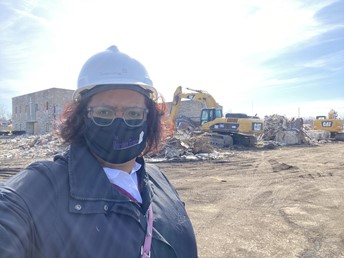For construction firms and skilled tradespeople, there is more work to be done than people to do it. This is both a blessing and a curse. The blessing is job security and knowing you work in a vital role that changes lives and communities. The curse is longer project timelines and more expensive budgets because there are fewer people to do the work. But we believe a combination of technology and rising interest in good-paying jobs that don’t require a college degree will soon put this curse to an end. Because transformation is happening in the construction talent pipeline. Here’s why—and how.

Statistics About Construction Industry Talent Market
In its 2020 Construction Outlook Survey, the Associated General Contractors of America reported that 81% of construction firms are challenged to fill both hourly and salaried skilled trade positions. While this sounds—and is—incredibly difficult to navigate at times, it’s also not a new situation for contractors or construction managers.
As home construction bottomed out in the Great Recession of 2008-2011, many contractors and builders left the industry and did not return. An additional 975,000 jobs were lost in April 2020 when the COVID shutdown happened, and only around 60% of those positions have recovered, according to Tradesmen International.
What does this mean for the construction industry? Around half of the firms expected to increase their headcount by as much as 10%, assuming the talent is available to hire.
Who Are the Next Generation of Skilled Tradespeople?
The rising cost of college is only the most basic reason that generations like Gen Z (born 1995-2010) are anticipated to pass on college in favor of launching a career. Another predicted driver of this trend is the slow pace of innovation in higher education. At the rate technology is advancing, many younger professionals recognize they can get a better and more useful education on the job with their employer than in the classroom.
This is great news for the skilled trades because it gives us the opportunity to dispel cultural myths about working in construction. Construction and skilled trade jobs are some of the highest paying and most secure in the economy. And the opportunity to adopt technology allows construction employers a chance to eliminate some parts of the jobs that may be scaring off younger employees, like safety concerns and long hours.
If you would like to receive training in Construction and obtain a safety certification, there are classes being offered at CAFE and PACE.
Digital Transformation in Construction
Digital transformation in construction is happening through both devices and education. 32% of firms surveyed by the Associated General Contractors of America have adopted some sort of labor-saving technology to balance the needs created by the talent gap. Examples include drones, robots, 3D printers, and GPS-guided equipment. While workers may not want to take on traditional skilled trades work, there are jobs of the future being created in the design, operation, and maintenance of these kinds of devices.
Digital at-home supplemental education for skilled trades workers is also a rising trend. Penn Foster predicts that allowing new and continuing employees to study at home for trade certifications and continuing education credits will be increasingly common, if not expected by new employees in the wake of the pandemic. This isn’t just important for laborers like electricians, plumbers, contractors, steelworkers, pipefitters, or any other skilled trade, but also for construction managers. One study reported that inexperienced construction project managers taking the lead in the early stages of a project can lead to costly delays, poor quality workmanship, and ultimately cause more experienced workers to leave a team because they don’t like the environment.
The Darden Group LLC has positioned our online course, Effective Tools for a Successful Contractor, to address many of these needs and trends at the same time. Our founder Akilah Darden created this course drawing on her knowledge after over 20 years as a construction manager, leading projects across 15 market sectors and achieving all her work on time and on budget.
The course can be completed online in just a few hours, or students can take up to 90 days to complete the course. Since the course is approved by the Construction Manager Certification Institute, it counts for 2.5 continuing education credits as well. This course empowers new and existing employees to step into a project management position with strategies and solutions at their disposal. Students will learn about cost management, timeline management, effective communication, and more. One more amazing fact, you get to print out the interactive 50-page workbook and take it with you to your office and/or your jobsite to use, right now!
Learn More About Effective Tools for a Successful Contractor
In addition to our own course, we also work closely with many community organizations to connect people interested in getting into construction with jobs and training opportunities in Central Indiana. Get in touch with us to learn more about how you can be part of the transformation happening in construction.




